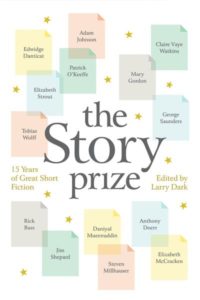
Saunders, McCracken, and More: Advice from Masters of the Short Story
Former Winners of the Story Prize Offer Some Thoughts on Writing
Tobias Wolff: “Writing, for me, is a continual process of negotiation with what I’ve written before. I think it is for a lot of writers.”
“There are just so many stories that are snowflake perfect. They’re perfect. You’re always after that with what you’re writing. I’m sure it’s no less true for novels, but there’s something about the size and manageability of the short story. You can walk around it, sculpt it here and there, lean back, see it whole. Perfection is something you’re always after. But as you change over time, so does your notion of perfection.”
“The matter you have to decide for yourself is: Is this as good as I can make it, as I am now? You don’t know all your deficits. You don’t know your blind spots. You just have to hold yourself to the best standard that you’re capable of. If you can answer that question for yourself—say, ‘This is as good as I can make it’—then you’re done with it.”
–Onstage interview at The Story Prize event March 4, 2009
*
Anthony Doerr: “One of the many strengths of short story collections is that they can potentially range more widely than a novel, maybe encompass a greater variety of human experience. If you think of a writer’s interest as a courtyard, you can make a lot more windows onto that courtyard in a story collection.”
“I don’t see my own life as necessarily all that interesting. I’m not mining or cannibalizing my own direct experience to write stories. I’m sure those of you who are writers have all heard this advice: Write what you know. Fundamentally that is good advice. You’re writing about heartbreak or feeling lost or feeling scared or feeling anxious—these things that you have gone through. But that doesn’t mean necessarily that if you are a violinmaker for sixty years, you should only write stories about violinmakers. You should assume that there are enough commonalities in human experience that you can write about a Finnish washerwoman in 1512.”
–Onstage interview at The Story Prize event March 2, 2011
The world is so fundamentally interesting and it makes me fall in love with it a dozen times a day. Part of my goal as a writer is to say to a reader: Look at this life we’re living, look how enormous the scales of time are, look how incredibly old and marvelous this situation is we’ve lucked into.
–From a post on TSP: The Story Prize blog July 26, 2010
*
George Saunders: “If you feel that there’s a comic riff that’s based on cruelty, if you say No, but I’m compassionate, I won’t do that, you’ve lamed yourself in a certain way. So the way I think of it is it’s not compassion but just: Have you spent sufficient time with the character to not be missing anything that he might have to offer? If you say: Jim was an asshole. All right, that’s not great. Well, let’s be more specific. When was Jim an asshole? On Wednesday, Jim was an asshole. Where? On Wednesday, Jim was an asshole at the coffee shop. How? Jim was an asshole when he was rude to the barista. How? He insulted her because she was slow. Why did he do that? She reminded him of his dead wife. Boom! Suddenly, he’s not an asshole. He’s a sweetheart. But you didn’t get there by saying, Let’s be kind to Jim.”
“My whole trajectory in writing has been to learn that I’m better off when I don’t know anything about what’s going to happen. I don’t want to have any real hopes for the story except that it won’t be dull.”
–Onstage interview at The Story Prize event March 5, 2014
*
Elizabeth McCracken: “I honestly don’t know how conscious anything I do is. It all seems like a blunder, and, when it comes out right, I’m delighted.”
“I can’t say that I have any religious belief, but to the extent to which I believe there is redemption in the world of sadness, it is through black humor. In the worst moments of my life, there is always a joke to be made, and that’s a deep comfort to me. It’s not putting off feelings; it’s part of sad things.”
–Onstage interview at The Story Prize event March 4, 2015
*
Elizabeth Strout: “The people in this book were very real for me. They have to be for me to continue to write them. Otherwise, if they’re not, then they just get tossed on the floor—literally. But these people were very, very real to me. I didn’t write the stories in order because I don’t write anything in order. I don’t even write a story from beginning to end.”
“If I could take whatever was most pressing in my own chest and just put that emotion—completely transpose it but use that emotion in a scene—the scene would probably last or have a better chance of lasting than if I was just trying to write the beginning of a story. That’s when I learned to write in scenes that would, hopefully, have a heartbeat to them.”
–Onstage interview at The Story Prize event February 28, 2018
______________________________________




















